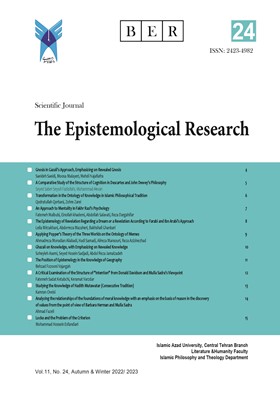The Epistemology of Revelation Regarding a Dream or a Revelation According to Farabi and Ibn Arabi’s Approach
Subject Areas : Epistemological researchesLeila Mirzakhani 1 , Abdorreza Mazaheri 2 , bakhshali ghanbari 3
1 - Ph. D. Candidate of Islamic Mysticism, Central Tehran Branch , Islamic Azad University, Tehran, Iran
2 - Professor of Islamic Mysticism, Central Tehran Branch Islamic Azad University, Tehran, Iran
3 - Associate Professor of Religions and Mysticism, Central Tehran Branch , Islamic Azad University, Tehran, Iran
Keywords: dream, Epistemology, revelation, Farabi, Ibn Arabi,
Abstract :
God speaking with the messenger and the quality of revelation received has been the vital problem for theologians and philosophers during the Islamic history. Islamic thinkers such as Farabi and Ibn Arabi have encountered this issue through what vision and form can be sent to the Prophet. Can other people except messengers like philosophers or mystics achieve that or not? If so, what are the differences between them and the prophet? Farabi has used his imagination to solve this problem. It can play the role of intermediate to make the relationship between simple and immaterial God and the prophet who is living in change and time, acceptable. That is why some contemporary scholars interpreted the revelation as a dream. Ibn Arabi criticized Farabi’s thought, he has mentioned that the imagination is beyond the reason which is in need of senses, memory and rational faculty which is subjected to the error. Since Farabi’s approach may be considered by certain philosophers, it has its own importance. Ibn Arabi’s answers are the modern discussion which has not been presented by any one so far. As a result, it should be said that considering the revelation as an imaginative phenomenon is a sort of reductionism which has descended it to the level of unveiling and intuition. The koranic words considered as existence will be reduced to human words. While the revelation is allusion and human words are the passage.
ابن عربی، محییالدین. (1379). شرح خوارزمی بر فصوصالحکم، تحقیق حسنزاده آملی، قم، انتشارات حوزة علمیه قم.
همو. (1370). فتوحات مکیه (چهارجلدی)، بیروت، نشر دار احیاء التراث العربی.
همو. (1400). رسائل، «رسالة المعراج و تنزیل حرف الأدخال و الأخراج»، ترجمه و شرح عبدالرضا مظاهری، تهران، انتشارات نفحات.
همو. (1399). رسائل «کتاب الأعلام باشارات اهل الهام»، ترجمه عبدالرضا مظاهری و زهره معصومی، تهران، انتشارات نفحات و ساوا.
همو. (1997). رسائل ابن عربی، کتاب المسائل، تقدیم و ضبط محمد شهابالدین العزیی، بیروت دارصادر.
ابنکمونه. (1383). تنقیح الابحاث فی الملل الثلاث، تصحیح علی نقی منزوی، تهران، انجمن آثار و مفاخر فرهنگی.
ابن ترکه اصفهانی، صائن الدین. (1381). تمهید القواعد، مقدمه، تصحیح و تعلیق سید جلال الدین آشتیانی، قم، بوستان کتاب.
فرغانی، سعید الدین. (1379). مشارق الدرّاری، قم، انتشارات دفتر تبلیغات اسلامی.
سروش، عبدالکریم، محمد راوی رؤیاهای رسولانه، مقاله دوم.
فارابی. (1986). آراء اهل المدینة الفاضلة، تصحیح آلبیر نصری، بیروت، دارالمشرق.
همو. (1964). سیاسة المدینه، تصحیح نوزی بخار، بیروت، المطبعة الکاتولیکیة.
قونوی، صدرالدین. (1375). اعجاز البیان یا تفسیر سورة فاتحه، ترجمه محمد خواجوی، تهران ، انتشارات مولی.
کینبرگ، لنه. (1398). رؤیا و خواب، ترجمه امیر مازیار، درمک اولیف، جین دمن، دایرةالمعارف قرآن، ج 3، تهران، انتشارات حکمت.
مازیار، امیر. (1400). رؤیا، استعاره و زبان دین، انتشارات کرگدن.
محمدی وایقانی، کاظم. (1375). آتش نهفته، شرح زندگانی، اندیشه و سلوک بایزید بسطامی، نشر بچهها سلام.
مظاهری، عبدالرضا. (1397). وحی و تجربه دینی از دیدگاه ابن عربی و روشنفکری دینی معاصر، انتشارات نفحات، تهران.
همو. (1385). شرح نقشالفصوص ابن عربی، انتشارات خورشید باران، تهران.
ملایری، موسی. (1393). تبین فلسفی وحی، انتشارات کتاب طه ، تهران.
غفاری، حسین و امیر مازیار. (1397). معرفتشناسی در فلسفة اسلامی، تهران، حکمت.
_||_

